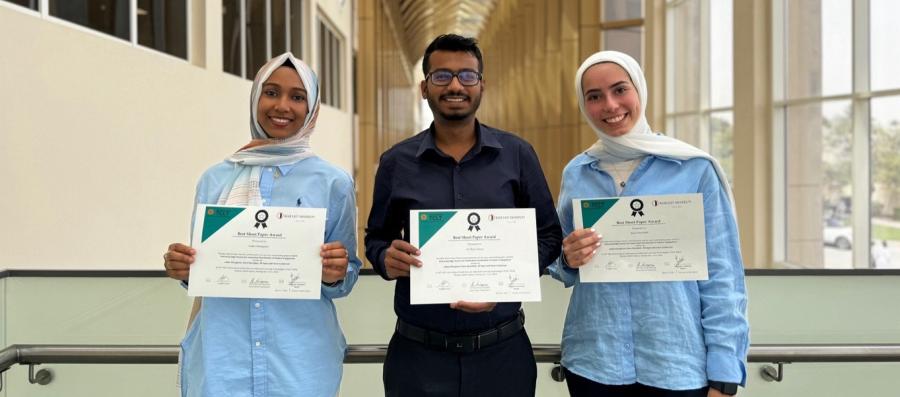- About
- Admissions
- Study at AUS
- Prospective Students
- Bachelor's Degrees
- Master's Degrees
- Doctoral Degrees
- Admission Publications
- International Students
- Contact Admissions
- Grants and Scholarships
- Sponsorship Liaison Services
- Testing Center
- New Undergraduate Student Guide
- New Graduate Student Guide
- File Completion
- New Student Orientation
- Payment Guide
- Executive Education
- Students with Disabilities
- Academics
- Life at AUS
- Virtual Campus Tour
- Around Campus
- One Stop Solution Center
- Residential Halls
- Commercial Outlets
- Athletics and Recreation
- Celebrating our Graduates
- Health and Wellness
- Student Life
- Sustainability
- Merchandise
- Alumni
- On-Campus Services
- Students with Disabilities
- AUS Leopards Day
- Fazaa
- Complaint Hotline
- Research
- Contact Us
- Apply Now
- .

AUS team wins Best Short Paper Award for AI-powered student engagement device at IEEE ICALT Conference 2024
An American University of Sharjah (AUS) engineering team won the Best Short Paper Award at the IEEE International Conference on Advanced Learning Technologies (ICALT) 2024 for developing an AI-powered device that measures student engagement in real-time in both virtual and physical classrooms.
Driven by the surge in online learning spurred by the COVID-19 pandemic, the paper focuses on the development of a compact, standalone device that gauges student engagement. Utilizing a camera and AI, this device captures and analyzes student video feeds to assess their engagement in real-time.
Having experimented with various state-of-the-art neural network models, the research team achieved a 95 percent accuracy rate in measuring student engagement. They also demonstrated that the model could perform seamlessly on portable devices like the Nvidia Nano GPU, processing video at real-time speeds of over 16 frames per second.
Selected to receive the award from a pool of 53 short research papers accepted at the global technology conference, the paper was co-authored by computer science majors Lodan Elmugamer and Rana Gharaibeh, Ali Reza Sajun, Computer Science and Engineering Lab Instructor, and Dr. Imran Zualkernan, Professor and Head of the Department of Computer Science and Engineering (CSE).
“Working on this paper was both challenging and rewarding. We started this project about a year ago, focusing on creating a small device with a camera to track student engagement. My primary role was writing the code to train seven deep learning models then converting them for employment on edge devices such as smartphones, IoT devices or embedded systems. This process was complex and time-consuming, requiring significant trial and error. Throughout this process, my team and I often worked late into the night, driven by our passion for the project and a shared goal of making a meaningful impact,” said Elmugamer.
Having presented the paper on behalf of her team, Elmugamer described the experience as “unforgettable.”
“Preparing and rehearsing for this conference required a level of detail and professionalism beyond typical presentations, but it was worthwhile with my co-authors' invaluable support boosting my confidence. Winning the Best Short Paper award was a dream come true and an incredible recognition of our hard work. It felt surreal to have our project appreciated by experts in the field, and it was an honor to represent our team,” she said.
Elmugamer and Gharaibeh are also members of the CSE AI for a Sustainable Future research group at AUS and were also enrolled in CSE's Future Thought Leaders program, which encourages undergraduate research.
“Being part of the CSE AI for a Sustainable Future research group at AUS and the CSE's Future Thought Leaders program in the College of Engineering has profoundly influenced my work on this project. These programs have taught me innovative research and real-world applications. The mentorship and guidance of experienced and accomplished individuals, namely Mr. Ali Reza, who taught me everything I needed to know about deep learning and hardware integration to complete this research, were invaluable. Additionally, the guidance from Dr. Zualkernan was crucial throughout the project, providing insights that enhanced our work. The opportunity to learn from such knowledgeable mentors and being part of a collaborative environment has been amazing. The supportive faculty and access to advanced resources at AUS prepared me well for the technical and collaborative aspects of the project, significantly influencing our successful participation in the conference,” said Gharaibeh.
Plans are underway to refine the device, enhancing its accuracy and usability at reduced cost.
To learn more about the AUS College of Engineering, visit www.aus.edu/cen.

